Avoid your inquiry is delay response, please enter your WhatsApp/Skype along with the message, so we can contact you at the very first time.
We will reply you within 24 hours. If for urgent case, please add WhatsApp/WeChat: +86 16652801818,. Or call +86 16652801818 directly.
*We respect your confidentiality and all information are protected. We will only use your information to respond to your inquiry and will never send unsolicited emails or promotional messages.
Juggling multiple machines on a job site? Wasting precious time switching between digging and loading? Limited budgets making it tough to acquire both an excavator and a loader? This inefficiency hinders productivity, delays construction projects, and strains resources. Solve this with the ultimate multi-tasker: the backhoe loader.
The primary advantages of a backhoe loader stem from its remarkable versatility, effectively combining the digging power of an excavator with the material handling skills of a loader in one piece of equipment. This reduces initial investment, lowers operating costs, enhances maneuverability on crowded job sites, and boosts overall productivity by tackling a wide range of construction tasks from trenching to loading.
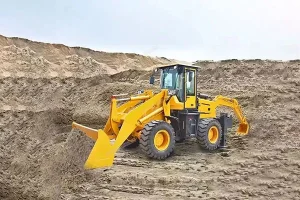
As Construction Equipment Manufacturing plants, we have decades of experience in the heavy equipment industry. We understand that for our valued customers – Construction Contractors, Farmers & Agri Dealers, Landscaping & Forestry Companies, Machinery Rental Companies, and Government/Public Tender evaluators – Durability & Reliability, Ease of Use & Features, Load Capacity, and the strength of the power system are non-negotiable priorities. The backhoe loader is meticulously designed and built to deliver on these fronts, making it one of the most indispensable machines in the construction industry.
A backhoe loader, often simply called a backhoe, is a highly versatile piece of heavy equipment based on a tractor chassis. Its defining characteristic is the combination of two primary work tools:
Operators control both the loader at the front and the backhoe at the rear from a central, often rotating, cab. Most backhoe loaders also feature stabilizers (outriggers) at the rear, which are lowered during digging operations to prevent the loader from tipping and provide a stable platform. This dual functionality makes the backhoe loader a true multi-tasker on any construction site.
While a backhoe loader combines functions, it’s important to understand how it differs from dedicated heavy equipment like excavators and wheel loaders:
Backhoe Loader vs. Excavator:
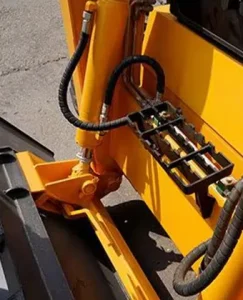
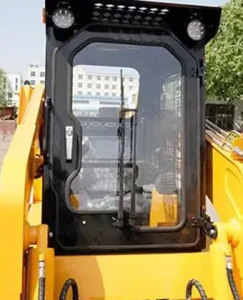
Backhoe Loader vs. Wheel Loader:
Essentially, the backhoe loader acts as a bridge, offering good capabilities from both worlds in one machine, making it exceptionally versatile, though potentially less specialized than a dedicated excavator or wheel loader for very large-scale tasks.
The single biggest advantage of backhoe loader machines is their incredible versatility. Think of it as getting two essential pieces of heavy equipment – an excavator and a loader – rolled into one robust package. This “two-in-one” nature provides significant advantages for a wide range of construction and utility work.
Imagine a typical construction site scenario: you need to dig a trench for utilities (excavation), then backfill it, load excess soil onto a truck, and finally grade the area. A backhoe loader can handle all these tasks sequentially without needing another machine. The operator simply swivels the seat in the cab to switch between controlling the front loader and the rear backhoe attachment. This seamless transition saves immense time and boosts productivity dramatically.
This versatility is particularly valuable for Construction Contractors working on smaller construction projects or in tight spaces where bringing multiple large machines is impractical or cost-prohibitive. For Machinery Rental Companies, backhoe loaders are versatile rental assets, appealing to a broad customer base needing multi-functionality. Farmers and Landscapers also benefit immensely, using the backhoe loader for everything from digging ditches and planting trees to moving feed and clearing land. This adaptability is what makes backhoe loaders so popular.
The “backhoe” part of the backhoe loader refers to the articulated digging arm at the rear. This powerful hydraulic tool is what gives the machine its excavation prowess. The backhoe attachment is incredibly effective for a variety of tasks:
The reach and digging depth of the backhoe attachment allow operators to tackle substantial digging jobs efficiently. The precision offered by modern hydraulic controls ensures accuracy, minimizing disturbance to the surrounding landscape or job site. The backhoe capabilities are a cornerstone of the machine’s value.
Positioned at the front of the machine, the loader attachment provides the material handling muscle of the backhoe loader. This front end loader component excels at:
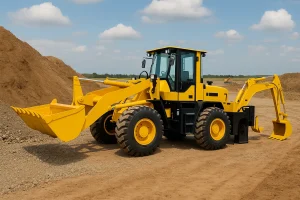
The loader attachment significantly enhances the backhoe loader’s utility, transforming it from just a digging machine into a comprehensive material handler. The combination of the loader bucket on the front and the backhoe at the rear allows a single operator to manage multiple phases of a project, boosting efficiency and reducing the need for additional support equipment or labor.
Compared to larger, specialized heavy equipment, the backhoe loader offers excellent maneuverability, making it highly effective across diverse construction locations:
This combination of road-worthiness (for short distances), compact dimensions, and responsive handling allows the backhoe loader to navigate and work efficiently where larger machines might struggle. This maneuverability is a key factor driving its popularity among contractors and construction companies.
For our target customers, the strength of the power system and overall reliability are critical. Backhoe loaders are designed to deliver robust performance across their dual functions, relying on several key elements:
A well-engineered backhoe loader balances power, efficiency, and Durability & Reliability to ensure it can consistently perform demanding construction tasks day after day.
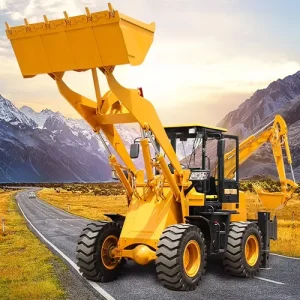
While the standard digging bucket and loader bucket are foundational, the true versatility of a backhoe loader is unlocked through its ability to utilize a wide array of hydraulic and mechanical attachments. These different attachments allow one machine to perform tasks that would otherwise require multiple specialized pieces of equipment.
Common types of backhoe attachments and loader attachments include:
These backhoe loader attachments dramatically expand the machine’s functionality, making it an even more valuable asset for Construction Contractors, Landscapers, Farmers, and Machinery Rental Companies looking to maximize the utility of their heavy equipment investment. The ability to quickly switch attachments further boosts productivity.
For many businesses, buying a backhoe loader represents a highly cost-effective investment compared to purchasing separate machines. Here’s why:
While the initial cost is higher than some smaller specialized machines, the combined functionality, reduced operating expenses, and enhanced productivity mean the backhoe loader often provides a faster return on investment, especially for businesses tackling a wide range of construction tasks.
Selecting the right equipment is crucial for maximizing efficiency and return on investment. When choosing a backhoe loader, consider these factors:
Carefully evaluating these factors will help ensure the type of backhoe loader you select is the right equipment for your specific construction needs.
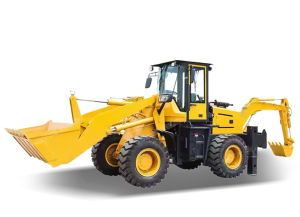
As Construction Equipment Manufacturing plants, we know that the machine itself is only part of the equation. Partnering with a reputable manufacturer provides critical advantages that align directly with the priorities of our customers:
Choosing construction equipment is a significant investment. Partnering with a manufacturer committed to quality, reliability, and customer support ensures you get a backhoe loader that is a valuable asset for years to come, helping Construction Contractors, Farmers, Landscapers, and Rental Companies succeed.
What’s the main difference between a backhoe loader and a mini excavator?
The biggest differences are versatility and mobility. A backhoe loader combines digging (backhoe) and loading (loader attachment) in one wheeled machine suitable for various tasks and travel between sites. A mini excavator is primarily a tracked digging machine with 360-degree rotation, often more maneuverable in very tight spaces for excavation but lacks the integrated loader.
Can a backhoe loader travel on roads?
Yes, one of the advantages of backhoe loader machines is their ability to travel on roads under their own power, unlike tracked excavators which require transport trailers. However, speed is limited, and operators must adhere to local traffic regulations regarding licensing, lighting, and securing the boom and bucket for travel.
How deep can a typical backhoe loader dig?
Digging depth varies significantly depending on the size and model of the backhoe loader. Smaller or compact backhoe models might dig around 8-12 feet deep, while larger, standard-sized machines can typically reach depths of 14-18 feet or even more. Always check the manufacturer’s specifications for the specific model.
Are backhoe loaders easy to operate?
Operating a backhoe loader proficiently requires training and practice. While modern machines feature ergonomic controls (often joystick-based), coordinating the movements of the boom, dipper, bucket, and stabilizers for the backhoe, or controlling the loader and steering simultaneously, takes skill. However, the basic principles are common across heavy equipment, and training programs are widely available.
What maintenance does a backhoe loader require?
Like any heavy equipment, regular maintenance is crucial for reliability and longevity. This includes daily checks (fluids, tire pressure, visual inspection), regular greasing of pivot points, periodic filter changes (oil, fuel, air, hydraulic), engine servicing, and inspection of hoses, belts, and structural components. Adhering to the manufacturer’s recommended maintenance schedule is essential.
Is financing available when purchasing a backhoe loader?
Yes, financing options are typically available through dealerships and specialized heavy equipment financing companies. As manufacturers, we often work with financing partners to help customers acquire the best construction equipment for their needs, whether buying a backhoe loader new or used.
The backhoe loader remains one of the most popular and valuable pieces of construction equipment for good reason. Here’s a summary of its key benefits:
As a leading Construction Equipment Manufacturing plant, we are committed to building backhoe loaders that deliver exceptional Durability & Reliability, performance, and value. We understand the challenges faced by Construction Contractors, Farmers, Landscaping Companies, Rental Fleets, and Government agencies.
Ready to experience the versatility and productivity benefits of a top-quality backhoe loader? Explore our full range of backhoe loaders designed for various construction needs. Have questions about specific models or attachments? Contact our equipment specialists today for expert advice. Learn more about our commitment to durable construction equipment or find financing options suitable for your business. Discover why a backhoe loader is an excellent choice for your next equipment investment and locate an authorized dealer near you. Let us help you find the perfect backhoe loader for construction and beyond. Check out our latest backhoe innovations.